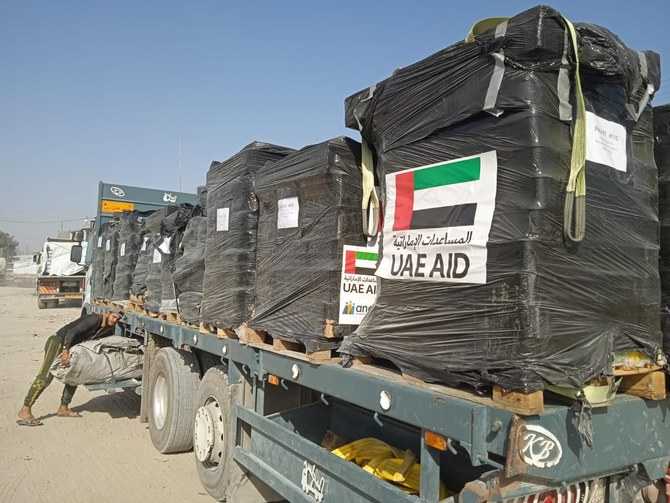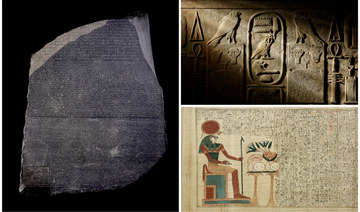CAIRO: The debate over who owns ancient artifacts has been an increasing challenge to museums across Europe and America, and the spotlight has fallen on the most visited piece in the British Museum: The Rosetta Stone.
The inscriptions on the black granite slab became the seminal breakthrough in deciphering ancient Egyptian hieroglyphics after it was taken from Egypt by forces of the British empire in 1801.
Now, as Britain’s largest museum marks the 200-year anniversary of the decipherment of hieroglyphics, thousands of Egyptians are demanding the stone’s return.
‘’The British Museum’s holding of the stone is a symbol of Western cultural violence against Egypt,” said Monica Hanna, dean at the Arab Academy for Science, Technology & Maritime Transport, and organizer of one of two petitions calling for the stone’s return.
The acquisition of the Rosetta Stone was tied up in the imperial battles between Britain and France. After Napoleon Bonaparte’s military occupation of Egypt, French scientists uncovered the stone in 1799 in the northern town of Rashid, known by the French as Rosetta. When British forces defeated the French in Egypt, the stone and over a dozen other antiquities were handed over to the British under the terms of an 1801 surrender deal between the generals of the two sides.
It has remained in the British Museum since.
Hanna’s petition, with 4,200 signatures, says the stone was seized illegally and constitutes a “spoil of war.” The claim is echoed in a near identical petition by Zahi Hawass, Egypt’s former minister for antiquities affairs, which has more than 100,000 signatures. Hawass argues that Egypt had no say in the 1801 agreement.
The British Museum refutes this. In a statement, the Museum said the 1801 treaty includes the signature of a representative of Egypt. It refers to an Ottoman admiral who fought alongside the British against the French. The Ottoman sultan in Istanbul was nominally the ruler of Egypt at the time of Napoleon’s invasion.
The Museum also said Egypt’s government has not submitted a request for its return. It added that there are 28 known copies of the same engraved decree and 21 of them remain in Egypt.
The contention over the original stone copy stems from its unrivaled significance to Egyptology. Carved in the 2nd century B.C., the slab contains three translations of a decree relating to a settlement between the then-ruling Ptolemies and a sect of Egyptian priests. The first inscription is in classic hieroglyphics, the next is in a simplified hieroglyphic script known as Demotic, and the third is in Ancient Greek.
Through knowledge of the latter, academics were able to decipher the hieroglyphic symbols, with French Egyptologist Jean-Francois Champollion eventually cracking the language in 1822.
‘‘Scholars from the previous 18th century had been longing to find a bilingual text written in a known language,’’ said Ilona Regulski, the head of Egyptian Written Culture at the British Museum. Regulski is the lead curator of the museum’s winter exhibition, “Hieroglyphs Unlocking Ancient Egypt,” celebrating the 200th anniversary of Champollion’s breakthrough.
The stone is one of more than 100,000 Egyptian and Sudanese relics housed in the British Museum. A large percentage were obtained during Britain’s colonial rule over the region from 1883 to 1953.
It has grown increasingly common for museums and collectors to return artifacts to their country of origin, with new instances reported nearly monthly. Often, it’s the result of a court ruling, while some cases are voluntary, symbolizing an act of atonement for historical wrongs.
New York’s Metropolitan Museum returned 16 antiquities to Egypt in September after a US investigation concluded they had been illegally trafficked. On Monday, London’s Horniman Museum signed over 72 objects, including 12 Benin Bronzes, to Nigeria following a request from its government.
Nicholas Donnell, a Boston-based attorney specializing in cases concerning art and artifacts, said no common international legal framework exists for such disputes. Unless there is clear evidence an artifact was acquired illegally, repatriation is largely at the discretion of the museum.
‘‘Given the treaty and the timeframe, the Rosetta Stone is a hard legal battle to win,’’ said Donnell.
The British Museum has acknowledged that several repatriation requests have been made to it from various countries for artifacts, but it did not provide The Associated Press with any details on their status or number. It also did not confirm whether it has ever repatriated an artifact from its collection.
For Nigel Hetherington, an archaeologist and CEO of the online academic forum Past Preserves, the museum’s lack of transparency suggests other motives.
‘‘It’s about money, maintaining relevance and a fear that in returning certain items people will stop coming,’’ he said.
Western museums have long pointed to superior facilities and larger crowd draws to justify their holding of world treasures. Amid turmoil following the 2011 uprising that toppled autocrat Hosni Mubarak, Egypt saw an uptick in artifact smuggling, which cost the country an estimated $3 billion between 2011 and 2013, according to the US-based Antiquities Coalition. In 2015, it was discovered that cleaners at Cairo’s Egyptian Museum had damaged the burial mask of Pharaoh Tutankhamun by attempting to re-attach the beard with super glue.
But President Abdel Fattah El-Sisi’s government has since invested heavily in its antiquities. Egypt has successfully reclaimed thousands of internationally smuggled artifacts and plans to open a newly built, state-of-the-art museum where tens of thousands of objects can be housed. The Grand Egyptian Museum has been under construction for well over a decade and there have been repeated delays to its opening.
Egypt’s plethora of ancient monuments, from the pyramids of Giza to the towering statues of Abu Simbel at the Sudanese border, are the magnet for a tourism industry that drew in $13 billion in 2021.
For Hanna, Egyptians’ right to access their own history should remain the priority. “How many Egyptians can travel to London or New York?” she said.
Egyptian authorities did not respond to a request for comment regarding Egypt’s policy toward the Rosetta Stone or other Egyptian artifacts displayed abroad. Hawass and Hanna said they are not pinning hopes on the government to secure its return.
‘‘The Rosetta Stone is the icon of Egyptian identity,’’ said Hawass. ‘‘I will use the media and the intellectuals to tell the (British) museum they have no right.’’
Egyptians call on British Museum to return Rosetta Stone
https://arab.news/8h87h
Egyptians call on British Museum to return Rosetta Stone

Hezbollah fires rockets at Israel after south Lebanon strike kills 4 members of family

- Shells fall on Kiryat Shmona and reach northern Golan
- Maronite Patriarch Bechara Al-Rahi calls for end to war in southern Lebanon
BEIRUT: An Israeli airstrike killed four members of a family in a border village in southern Lebanon on Sunday, security sources said.
Hezbollah, in retaliation, fired Katyusha rockets at the northern Israeli town of Kiryat Shmona, close to the Lebanese border.
The four family members killed in Mays Al-Jabal were identified as Fadi Hounaikah and Maya Ali Ammar, and their sons Mohammed, 21, and Ahmad, 12.
The attack occurred when the family took advantage of a de-escalation of hostilities between Hezbollah and Israel to return to their properties to assess damage and move goods from their supermarket to a location outside the village.

A security source in the area told Arab News that while the family was gathering their groceries from the supermarket, an Israeli military drone spotted them and launched an attack, destroying the area and killing all the members of the family and injuring several civilians in the vicinity.
The source clarified that villages in the area were empty because “residents fled the area seven months ago.”
He added: “When residents want to enter these villages to attend victims’ funerals, they send their names and car number plates to the Lebanese Army and UNIFIL, who in turn coordinate with the Israeli side to spare these funerals (from attack).
“In general, people cannot enter border villages without taking into consideration the Israeli danger, as Israeli reconnaissance planes and drones are hovering over the area 24/7. However, what Israel committed against this family is a terrible massacre.”
Hezbollah responded to the incident by launching dozens of Katyusha and Falaq missiles at Israel. The group said the operation was “in response to the crime committed by Israel in the Mays Al-Jabal village.”
The Israeli Upper Galilee Regional Council announced that missiles hit buildings in Kiryat Shmona, while Israeli Army Radio reported that some of the rockets fell inside the city, causing a power outage.
An Israeli army spokesman reported that 65 rockets were launched from southern Lebanon toward Israeli settlements in the Upper Galilee region.
Meanwhile, Israeli airstrikes hit the villages of Al-Adissa and Kafr Kila, while artillery shelling hit the village of Aitaroun.
Maronite Patriarch Bechara Al-Rahi in his Sunday sermon called for an end to the war in southern Lebanon, urging an end to the “demolition of homes, the destruction of shops, the burning of the land and its crops, and the killing and displacement of innocent civilians and the destruction of their livelihood in an economic condition that has already impoverished them.”
Mohammed Raad, leader of Hezbollah’s parliamentary bloc, meanwhile, expressed his disapproval of the West’s backing for Israel.
He said that Israel “faces no international deterrent. On the contrary, some support it in committing crimes.”
He accused those who support Israel of being “hypocrites and liars who falsely claim to champion human rights, civilization, and progress in the West, (yet) they provide Israel with financial aid, weapons, smart bombs, and a continuous air bridge.”
Raad concluded: “We are not afraid of Israel’s insanity. We are prepared to confront them directly. We are prepared to sacrifice and shed blood to protect our homeland, independence, and honor.”
UNRWA chief says again barred entry to Gaza by Israel

- “Just this week, they have denied — for the second time — my entry to Gaza where I planned to be with our UNRWA colleagues including those on the front lines”: Lazzarini
JERUSALEM: The head of the UN agency for Palestinian refugees, UNRWA, said Sunday that Israeli authorities had barred him from entering Gaza for a second time since the Israel-Hamas war started on October 7.
“Just this week, they have denied — for the second time — my entry to Gaza where I planned to be with our UNRWA colleagues including those on the front lines,” Philippe Lazzarini wrote on X, formerly Twitter.
Lazzarini has been to Gaza four times since the war broke out including on March 17.
“The Israeli authorities continue to deny humanitarian access to the United Nations,” he said on Sunday.
“Only in the past two weeks, we have recorded 10 incidents involving shooting at convoys, arrests of UN staff including bullying, stripping them naked, threats with arms & long delays at checkpoints forcing convoys to move during the dark or abort,” Lazzarini said.
He also called for an “independent investigation” into rocket fire that led to the closure of a key Israel-Gaza aid crossing.
Hamas’s armed wing, Ezzedine Al-Qassam Brigades, claimed responsibility for the Sunday launch, saying militants had targeted Israeli troops in the area of Kerem Shalom crossing.
Houthis claim Red Sea victory against US Navy

- Militia forces lack technical or military capability to achieve their objectives in the Mediterranean, analyst says
AL-MUKALLA: The Houthis have reiterated a warning of strikes against ships bound for or with links to Israel — including those in the Mediterranean — as they claimed victory against the US Navy in the Red Sea.
The Houthi-controlled SABA news agency reported that the fourth phase of the militia’s pro-Palestine campaign would involve targeting all ships en route to Israel that came within range of their drones and missiles, noting that the US, UK, and other Western navies “stood helpless” in the face of their attacks.
“The fourth phase demonstrates the striking strength of the Yemeni armed forces in battling the world’s most potent naval weaponry, the American, British and European fleets, as well as the Zionist (Israel) navy,” SABA said.
Houthi military spokesman Yahya Sarea said on Friday strikes against Israel-linked ships would be expanded to the Mediterranean. Attacks would be escalated to include any companies interacting with Israel if the country carried out its planned attack on the Palestinian Rafah.
Since November, the Houthis have launched hundreds of ballistic missiles and drones at commercial and navy vessels in the Red Sea, Bab Al-Mandab Strait and the Gulf of Aden. They claim attacks are only aimed at ships linked with Israel in a bid to force an end to its siege on the Gaza Strip.
They have also fired at US and UK commercial and navy ships in international waters off Yemen after the two countries launched strikes against Houthi-controlled areas.
On Saturday, Houthi information minister Dhaif Allah Al-Shami claimed the US was forced to withdraw its aircraft carrier and other naval ships from the Red Sea after failing to counteract attacks. He added new offensives would begin against Israeli ships in the Mediterranean in the coming days.
“They failed badly. Yemeni missiles and drones beat the US Navy, and its military, cruisers, destroyers and aircraft carriers started to retreat from our seas,” Al-Shami said in an interview with Lebanon’s Al-Mayadeen TV news channel.
Yemen specialists have disputed Houthi assertions that they have military weapons capable of reaching Israeli ships in the Mediterranean.
Brig. Gen. Mohammed Al-Kumaim, a Yemeni military analyst, told Arab News on Sunday the Houthis would only be able to carry out such attacks if they had advanced weaponry. He said the Houthis were expanding their campaign against ships to avoid growing public resentment in areas under their control after the militia had failed to pay public employees and repair services.
Al-Kumaim added the Houthis might claim responsibility for an attack on a ship in the Mediterranean which was carried out by an Iran-backed group operating in the region.
“Theoretically and technologically, the Houthis lack any technical or military capability to achieve their objectives (in the Mediterranean),” Al-Kumaim said.
Jordanian-Iraqi economic forum begins at Dead Sea resort

- A specialized session will focus on investment prospects in various economic sectors
AMMAN: Jordanian Minister of Investment Kholoud Saqqaf opened the Economic Forum for Financial, Industrial, and Commercial Partnerships between Iraq and Jordan on Sunday.
The forum, which is organized jointly by the Iraqi Business Council in collaboration with the Jordan and Amman chambers of industry, aims to strengthen economic ties between the two countries.
Held at the King Hussein Convention Center on the shores of the Dead Sea, the forum is the largest regional gathering for fostering economic cooperation between Jordan and Iraq, Jordan News Agency reported.
Over two days, the event will promote regional integration by facilitating economic connectivity and encourage collaboration across sectors.
Discussions will cover investment opportunities in Jordan and Iraq, prospects for commercial and industrial ventures, economic modernization initiatives, and opportunities in Jordan’s free and development zones.
Key figures attending include Kamel Dulaimi, the Iraq president’s chief of staff, ministers from Jordan and Iraq, as well as business leaders, investors and representatives from Arab and foreign companies.
Discussions are expected to focus on the banking sector’s role in providing financial support, while highlighting success stories from investment companies in both countries.
A specialized session will focus on investment prospects in various economic sectors, with a particular emphasis on mining and industry.
At the opening, Saqqaf highlighted investment prospects displayed on the Invest in Jordan platform, which align with the kingdom’s Economic Modernization Vision.
Meanwhile, Iraqi Minister of Industry and Mineral Resources Khaled Battal Al-Najm drew attention to his country’s industrial strategy and plans for a joint economic zone with Jordan, alongside efforts to address unemployment and attract foreign investment, especially in mining.
Dulaimi emphasized the significance of Iraqi President Abdul Latif Rashid’s recent visit to Jordan, underscoring discussions aimed at strengthening ties and enhancing economic systems to facilitate investment projects.
UAE delivers 400 tonnes of food aid to Gaza

- Delivery, specifically for the northern areas of the enclave, is enough to feed about 120,000 people
DUBAI: The UAE, in partnership with American Near East Refugee Aid, announced on Sunday that it had delivered 400 tonnes of food aid to Gaza.
The delivery, specifically for the northern areas of the enclave, is enough to feed about 120,000 people, Emirates News Agency reported.
Reem Al-Hashimy, Emirati minister of state for international cooperation, said: “The UAE’s safe and successful delivery and distribution of food relief to the Gaza Strip, especially the northern Gaza Strip, marks a significant scaling up in action.”
She continued: “We remain firmly committed to our position of solidarity with the brotherly Palestinian people and alleviating suffering in the Gaza Strip. The UAE, working in parallel with international partners, is determined more than ever to intensify all efforts to ensure that aid lifelines get to those who need it the most.”
Sean Carroll, CEO of ANERA, thanked the Emirati government for its assistance in getting the much-needed aid to the Palestinian people.
“ANERA and the people we serve are extremely grateful for support from the government and people of the UAE, that allows us to deliver this food to northern Gaza, where the needs are so great,” he said.
Last month the UAE allocated $15 million under Cyprus’s Amalthea Fund to bolster aid efforts in Gaza.
Meanwhile, the Gulf country continues to collaborate with international partners and organizations to enable the effective delivery of food and relief via land, air and sea.
To date, the UAE has dispatched more than 31,000 tonnes of humanitarian supplies, including food, relief items and medical supplies, using 256 flights, 46 airdrops, 1,231 trucks, and six ships.
The UAE has embarked on several sustainable relief projects to ensure a consistent supply of food and water to the people of Gaza.
These initiatives include the establishment of five automatic bakeries, the provision of flour to eight existing bakeries, and the installation of six desalination plants with a combined capacity of 1.2 million gallons of water a day.





















